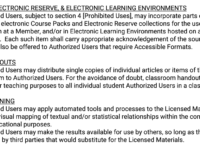Canadian copyright lobby groups have repeatedly tried to convince the government that the 2012 copyright reforms and Supreme Court fair dealing jurisprudence created a free-for-all in which education refuses to pay licence fees due to their reliance on fair dealing. The data from yesterday’s post on massive shift to site licences tells a different story, namely that Canadian educational institutions spend hundreds of millions annually on licences that provide both access works and the flexibility to use them in a myriad of ways. My Fair Dealing Week series on Canadian copyright, fair dealing and education (Setting the Record Straight) continues with another type of licence that has grown in importance in recent years: the pay-per-use or transactional licence. These licences, which grant access to, and use of, individual works, demonstrate that lobby group claims bear little relationship to reality. Indeed, if the lobby groups were right about unlimited uncompensated copying, why would education still spend millions a pay-per-use licences? They obviously wouldn’t, but since fair dealing represents a fair approach to both creators and users, education recognizes that fair dealing does not lead to the complete elimination of licensed copying.

Fair Dealing by Giulia Forsythe (CC BY-NC-SA 2.0) https://flic.kr/p/dRkXwP
Copyright
Canadian Copyright, Fair Dealing and Education, Part Two: The Massive Shift to Electronic Licensing
Canadian copyright lobby groups have spent years falsely claiming that educational institutions refuse to pay for licences to compensate for the use of educational materials. This second post in my Fair Dealing Week series on Canadian copyright, fair dealing, and education focuses on this claim, which is a gross misrepresentation of the data (first post on Setting the Record Straight). The truth is that Canadian universities spend millions of dollars on licensing copyright materials. In fact, over the past decade, the emergence of site licenses that provide access to millions of works – books, journal articles, newspapers, and more – has led to huge increases in expenditures for access. Unlike copyright licences from copyright collectives such as Access Copyright, these digital licences provide both original access to works and the ability to use them in course materials. In the 1990s, a university would both purchase a book and pay for the right to copy a portion of it to distribute to students as course materials. Today, the university can use a single licence to gain access to the book and make it available as course material, handouts and for many other purposes since most digital licences facilitate access and permit multiple uses.
Canadian Copyright, Fair Dealing and Education, Part One: Setting the Record Straight
Canadian copyright lobby groups have relentlessly lobbied the government to overturn decades of Supreme Court of Canada jurisprudence, seeking unprecedented restrictions on fair dealing that include eliminating it for educational institutions if a licence is available. In doing so, they have relied on a steady diet of misleading claims about the state of the law, the licensing practices of Canadian educational institutions, the importance (or lack thereof) of copying of materials in course packs, and the effects of fair dealing. This week is Fair Dealing Week, which provides an opportunity to set the record straight on Canadian copyright and education, backed by actual data on what takes place on university campuses across the country.
This blog series starts with an introduction to the issue and follows with upcoming posts on the growth of digital licensing within higher education, the gradual disappearance of course packs, the emergence of open access, the huge expenditures on transactional licensing that demonstrate a commitment to pay for materials where fair dealing does not apply, and the actual role of fair dealing (rather the false caricature painted by lobby groups). I covered many of these issues in a series five years ago, titled Misleading on Fair Dealing. This series will update the data, demonstrating that far from refusing to pay licensing fees, universities have continued to spend hundreds of millions of dollars on licensing access to materials. I am grateful to University of Ottawa law students Ephraim Barrera and Brianna Workman for their assistance on this project.
Why Quebec’s Demand for Changes to Bill C-11 Are A Product of Heritage Minister Pablo Rodriguez’s Risky Policy Choices
Canadian Heritage Minister Pablo Rodriguez took the stage at the Prime Time Conference in Ottawa on February 2nd prepared to take a victory lap on Bill C-11 before the industry crowd. Suggesting that royal assent was only days away, Rodriguez brushed aside Senate amendments to address user content regulation concerns and stated that he would not accept material changes to the bill. Yet within days, the Quebec government altered those plans, indicating that it was unhappy with the bill and demanding changes. The most notable change – reiterated in a motion passed in the National Assembly – would be mandated consultation with Quebec on policy directions from the government directed to the CRTC. Providing any province with a near-veto over federal communications policy should be a non-starter, meaning that Rodriguez risks going from culture hero in Quebec to the person who threatens its regulatory power over culture.
Quebec Demands Changes to Bill C-11 as it Wakes Up to the Implications of Losing Control over Digital Culture Regulation
Bill C-11 – and its predecessor Bill C-10 – have long been driven by the government’s view that the bill was a winner in Quebec. Bill C-10 was headed for easy passage in 2021, but was derailed by the government’s decision to remove safeguards over regulating user generated content that came largely from the Quebec-based music lobby. Nearly two years later, Canadian Heritage Minister Pablo Rodriguez and his staff have ignored the concerns of thousands of digital creators, disrespected indigenous creators, and indicated that he will likely reject Senate amendments designed to craft a compromise solution, all in the name of keeping Quebec lobby interests satisfied. Yet as the government considers the Senate amendments, the Quebec legislative assembly this week passed a last minute motion calling for further changes to the bill, including scope to enact its own rules and mandatory consultations with the province on the contents of a policy direction to the CRTC that Rodriguez has insisted on keeping secret until after the bill receives royal assent (a full copy of the motion is contained at the bottom of this post). The Conservatives have been calling for the Quebec motion and the Senate amendments to be sent back to committee for further study, which the Globe reports may delay the government’s response to the Senate amendments.











